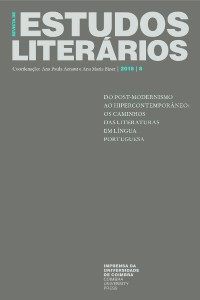Please use this identifier to cite or link to this item:
https://hdl.handle.net/10316.2/45166| Title: | Le Brésil et “ses autres”: Nihonjin, pour une histoire de l’immigration japonaise au Brésil | Other Titles: | O Brasil e “seus outros”: Nihonjin, uma história da imigração japonesa no Brasil Brazil and “its futures”: Nihonjin, a story of Japonese immigration in Brazil |
Authors: | Assunção, Sandra | Keywords: | immigration japonaise;autofiction;littérature brésilienne;Oscar Nakasato;Nihonjin;Japanese immigration;autobiographical novel;Brazilian literature;Oscar Nakasato;Nihonjin;imigração japonesa;autoficção;literatura brasileira;Oscar Nakasato;Nihonjin | Issue Date: | 2018 | Publisher: | Imprensa da Universidade de Coimbra | Abstract: | Nihonjin (2011) is the fi rst novel by the Brazilian author Oscar Nakasato
and in which he re-enacts the process of integration of the Japanese
immigrants who arrived in Brazil in the 1920s. Through the Inabatas’ saga,
the ex-centric subject of the official history is placed at the center of the
novel, which lies within the scope of a new generation of narratives about
immigration. The (re) construction of the family memory is thus the element
that sparks a writing process which is, at the same time, autobiographical
and metafictional which, in turn, defines the limits of its representation.
Through an intercultural compromise and a permanent inter-generational
antagonism, the present analysis will seek to understand Nihonjin as an
arena to discuss the place that the Nippon-Brazilians – an entity made by
permanent duality – occupy in the bosom of the “multicultural” nation. Nihonjin (2011), primeiro romance do escritor Oscar Nakasato, põe em cena o processo de integração dos imigrantes japoneses que chegaram ao Brasil nos anos 1920. Através da saga da família Inabata, o romance dá voz ao sujeito ex-cêntrico da história oficial, inscrevendo-se numa nova linhagem de narrativas sobre a imigração. A reconstrução da memória familiar é, inevitavelmente, o elemento desencadeador de um processo de escrita, ao mesmo tempo, autoficcional e metaficcional, definindo assim os limites da sua representação. Por meio de uma negociação intercultural e de um antagonismo intergeracional permanentes, interessa-nos compreender o romance Nihonjin como um espaço de discussão sobre o lugar que ocupa o nipo-brasileiro – um ser forjado por uma dualidade permanente – no seio da nação “multicultural”. Premier roman de l’écrivain Oscar Nakasato, Nihonjin (2011) met en scène le processus d’intégration des immigrés japonais arrivés au Brésil dans les années 1920. À travers la saga de la famille Inabata, le roman donne la parole au sujet ex-centrique de l’histoire offi cielle et s’inscrit dans une nouvelle lignée de récits sur l’immigration. La mémoire familiale est, ainsi, l’élément déclencheur d’un processus d’écriture à la fois autofictionnel et métafictionnel dans la mesure où sa (re) construction définit les limites de sa représentation. Par l’intermédiaire d’une négociation interculturelle et d’un antagonisme intergénérationnel permanents, il importe de comprendre, dans cette analyse, le roman Nihonjin en tant qu’espace de discussion sur la place du nippo-brésilien – cet être forgé dans une dualité permanente – au sein de la nation “multiculturelle”. |
URI: | https://hdl.handle.net/10316.2/45166 | ISSN: | 2182-1526 2183-847X (PDF) |
DOI: | 10.14195/2183-847X_8_15 | Rights: | open access |
| Appears in Collections: | Revista de Estudos Literários |
Files in This Item:
| File | Description | Size | Format | |
|---|---|---|---|---|
| le_bresil_et_ses_autres.pdf | 179.18 kB | Adobe PDF |  |
Items in DSpace are protected by copyright, with all rights reserved, unless otherwise indicated.
